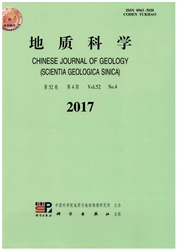

 中文摘要:
中文摘要:
郯庐断裂带是新生代以来中国东部大陆大地构造演化中最重要的构造带之一,对郯庐断裂的认识制约了大型盆地的形成演化的认识及油气资源的评价。本文在野外实地调查的基础上,从郯庐断裂带与地层的穿切关系入手,借助最新的地震反射剖面以及第一手野外资料,判定郯庐断裂带在新生代早期经历了强烈的活动,表现为左旋兼具逆冲的性质。通过分析覆盖在郯庐断裂带之上火山岩中的断裂发育样式和地震反射剖面上的地层覆盖关系,认为中新世以来,相当于渤海湾盆地的东营运动之后,构造应力场发生了变化,郯庐断裂带不再有显著的活动,发育了新的断裂体系。郯庐断裂新生代兼有垂向位移的走滑活动奠定了中国东部古近纪盆地形成、沉积演化和油气资源成藏的基本格局。
 英文摘要:
英文摘要:
The Tan-Lu fault zone, which played a key role in tectonic evoluiton of East China continent during Cenozoic, and controlled the formation and deformation of the large basins and their evaluation of petroleum resource, was one of the most important tectonic belts in eastern marginal areas of Asia. According to the geometrical features, the latest seismic reflection profiles and field survey, the paper considered that the Tan-Lu fault zone had undergone intense movement in Early Cenozoic, revealed by sinistral strike-slipping as well as thrusting. Based on the analysis of deformed Cretaceous covered by undeformed volcanic rocks in age of Neogene, and the relation between the fault and cover strata in seismic reflection profiles, it was thought that the Tan-Lu fault zone was not mobile remarkably from Miocene or Dongying Movement in area of the Bohai Bay Basin, since the tectonic stress field changed obviously. The strike-slipping, with oblique thrusting, of the Tan-Lu fault zone in Early Paleogene, founded the tectonic framework of creation and deformation of the sedimentary basins, and formation and secondary generation of hydrocarbon reservoirs of Cenozoic in East China.
 同期刊论文项目
同期刊论文项目
 同项目期刊论文
同项目期刊论文
 期刊信息
期刊信息
